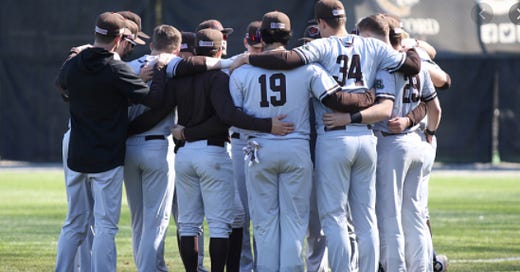Ivy League Says No to Science and Yes to Cancelling Spring Season for All Student Athletes
It's opening day across the country except in the Ivy League because...equity?
Elite academic institutions like those that make up the Ivy League pride themselves on being at the forefront of emerging science, especially during a global pandemic. A quick look at some of their mission statements reveals themes like “research,” “broad inquiry” and “opportunity.” It is no surprise that many of the leading voices on the pandemic are affiliated with Ivy League institutions, including Harvard Medical School professor, Rochelle Walensky, who recently became the new director of the CDC.
So how is it then that as colleges around the country gear up for their baseball teams’ opening day this weekend, student athletes in the Ivy League are grappling with the crushing news that all spring sports in their conference have been canceled. Theirs is the only league in Division I of the NCAA to have put the brakes on the upcoming sports season.
Athletes were told that if they followed all the protocols, did everything asked of them, and stayed healthy, they’d be able to play. They held up their end of that bargain. And they still can’t play.
According to the New York Times, the Ivy League’s presidents have been steadfast in their commitment to the core principle that “athletes must be treated essentially the same as students who do not play sports.” They made the decision in the name of “equity” – a concept that increasingly means that if everyone can’t have something then no one can have it.
In an official statement, the presidents assert that “continuing on-campus operations requires limitations on travel, visitors, gatherings and other elements that are essential for intercollegiate athletics competition.” The statement described the decision as “necessary.”
Why have so many other leagues not found such a decision to be necessary? What specific science or evidence can they cite to defend their decision?
Zach Fogell is a junior on the baseball team at Brown. When I asked for his thoughts about the decision, he had this to say:
“Finding out our season was canceled and realizing all the hard work of my teammates and I would not be shown this collegiate season is devastating. Not only do we not have a season but we were notified about the decision in a tweet at the same time as the public—this makes us feel as though the Ivy League does not care about its athletes.”
Unless something drastic changes with the virus, spring sports will go on at the vast majority of colleges and universities. Those in the Ivy League will have to watch and wonder why their opportunity to compete was needlessly stripped away.
They deserve so much better from the institutions they proudly represent as student athletes.
This first ran here as my monthly column in my local paper.





There will always be a loophole for the old boys club. Although Ivy League students must graduate in 4 years, athletes across the league took advantage of a blanket waiver allowing for a 5th year of eligibility. Student athletes have either withdrawn or taken leaves of absence from their institutions to pursue “meaningful work.” Many of the athletes currently on leave are from some of SoCal’s most prestigious schools. The same schools that decry privilege.